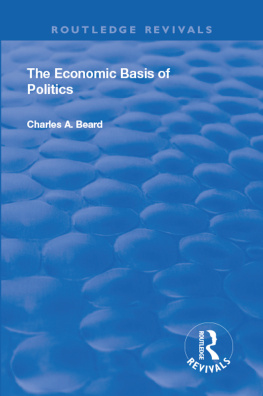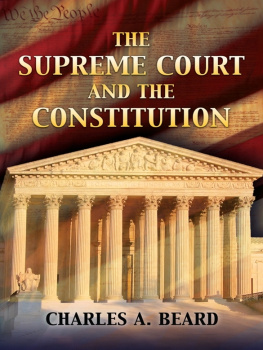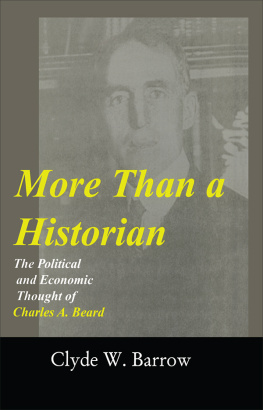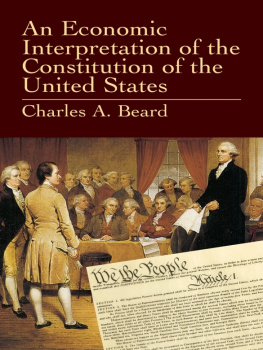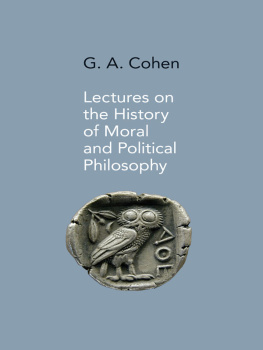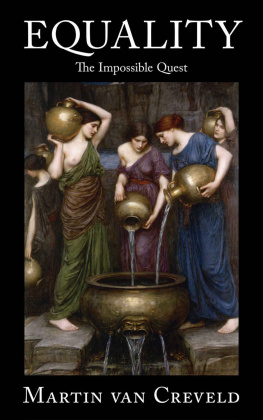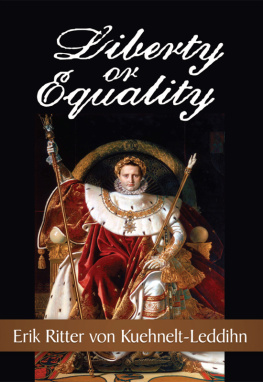Routledge Revivals
The Economic Basis of Politics
The Economic Basis of Politics
by
Charles A. Beard
First published in 1922 by Alfred A. Knopf
This edition first published in 2018 by Routledge
2 Park Square, Milton Park, Abingdon, Oxon, OX14 4RN
and by Routledge
52 Vanderbilt Avenue, New York, NY 10017, USA
Routledge is an imprint of the Taylor & Francis Group, an informa business
1922 by Taylor and Francis
All rights reserved. No part of this book may be reprinted or reproduced or utilised in any form or by any electronic, mechanical, or other means, now known or hereafter invented, including photocopying and recording, or in any information storage or retrieval system, without permission in writing from the publishers.
Publishers Note
The publisher has gone to great lengths to ensure the quality of this reprint but points out that some imperfections in the original copies may be apparent.
Disclaimer
The publisher has made every effort to trace copyright holders and welcomes correspondence from those they have been unable to contact.
A Library of Congress record exists under ISBN:
ISBN 13: 978-0-367-17925-0 (hbk)
ISBN 13: 978-0-429-05849-3 (ebk)
The Economic Basis of Politics
SOME RECENT BORZOI BOOKS
IN DAYS TO COME
By Walter Rathenau
EARLY CIVILIZATION:
AN INTRODUCTION TO ANTHROPOLOGY
By Alexander A. Goldenweiser
HUMAN NATURE IN POLITICS
By Graham Wallas
HOW ENGLAND IS GOVERNED
By Rt. Hon. C. F. G. Masterman
PRINCIPLES OF SOCIAL PSYCHOLOGY
By James Mickel Williams
THE HISTORY OF SOCIAL DEVELOPMENT
By Dr. F. Mller-Lyer
THE FOUNDATIONS OF SOCIAL SCIENCE
By James Mickel Williams
For sale at all bookshops
For further particulars address
ALFRED A. KNOPF, Publisher NEW YORK
The Economic Basis of Politics
by
Charles A. Beard
COPYRIGHT, 1922, BY
ALFRED A. KNOPF, INC.
Published, April, 1922
Set up and printed by the Vail-Ballou Co., Binghamton, N. Y.
Paper furnished by W. F. Etherington & Co., New York, N. Y.
Bound by the H. Wolff Estate, New York, N. Y.
MANUFACTURED IN THE UNITED STATES OF AMERICA
Prefatory Note
This little volume is composed of four lectures which I gave at Amherst College in 1916 on the Clark Foundation. They are reproduced as delivered except for minor changes and for a revision of the fourth lecture in the light of recent political experience. The reasons for occasional repetitions are therefore apparent.
CHARLES A. BEARD.
New Milford, Conn.,
October 5, 1921.
Contents
T HE founders of this lectureship desire to help carry forward the eternal quest of mankind for ways and means with which to control its social destiny for noble ends. Some of the most splendid traditions of the race are associated with this search. The mystic Plato, the sagacious Aristotle, the gentle Sir Thomas More, and the courageous Condorcet, to mention none nearer our time, sought far and wide for the key to the great mystery. The fruits of their labors are a priceless heritage.
The imperious Burke likewise thought the theme worthy of his talents, but he soon gave it up, confessing defeat. I doubt, he says, whether the history of mankind is yet complete enough, if it ever can be so, to furnish ground for a sure theory on the internal causes which necessarily affect the fortune of a state. I am far from denying the operation of such causes: but they are infinitely uncertain, and much more obscure and much more difficult to trace than the foreign causes that tend to raise, to depress, and sometimes to overwhelm a community. It is often impossible, in these political inquiries, to find any proportion between the apparent force of any moral causes we may assign and their known operation. We are therefore obliged to deliver up that operation to mere chance, or, more piously (perhaps, more rationally), to the occasional interposition and irresistible hand of the Great Disposer. In short, confronted by the complex and bewildering facts of social life, Burke cries aloud, with the mediaeval priest overwhelmed by the horror of the Black Death, Deus vult.
In the field of natural science, such a confession is a plea of intellectual bankruptcy. In that sphere persistent and penetrating research, relentless and unafraid, brings about the progressive conquest and subjugation of the material world. Indeed the very research in mechanics and chemistry that produced the machine age has torn asunder the foundations of the old social order, released new and terrifying forces, and now threatens the dissolution of society itself. The present plight of the world seems to show that mankind is in the grip of inexorable forces which may destroy civilization if not subdued to humane purposes. It may be that in the end we must, with Burke, confess the futility of our quest. Even then we shall say with Heine:
Also fragen wir bestndig
Bis man uns mit einer Handvoll
Erde endlich stopft die Muler,
Aber ist das eine Antwort?
So the eternal search goes on. At the very outset the seekers are confronted by two conflicting theories concerning the problem itself. These are summed up by John Stuart Mill at the opening of his famous work on representative government. According to one of them, government, namely, human control, is merely a problem in invention, of determining what is best and adapting our means to the desired end. According to the other theory, government is not a matter of human choice at all but an inevitable, natural growth in which the purposes of man have no part.
Each of these doctrines, we must admit with Mill, is untenable if pushed to an exclusive and logical conclusion; yet somewhere in between them lies important truth. Long the victim of material forces, man has, by taking thought, made himself master of wind and wave and storm. May he not, by taking thought, lift himself above the social conflicts that destroy civilizations and make himself master of his social destiny? Perhaps not; but as the human mind is greater than the waterfall which it compels or the lightnings flash which it confines, so the control of human destiny is a nobler object of inquiry than the search for material power. Even though every door be slammed in our faces, still must we knock.
As the theme is old, we, as humble students, must, of necessity, first survey the conclusions of the great masters who have gone on before. We must first find out what they thought about the nature of the forces which are responsible for the origins, forms, and changes of political institutions.
At the beginning of such an inquiry we face, of course, the mighty Aristotle, the master of all them that know. He rightly deserves to be called the father of political science because he took it out of the sphere of utopian idealism where Plato left it and placed it on the strong foundation of natural history. As Oncken rightly says, it was the use of the methods of natural science in his inductive studies that enabled Aristotle to make his great contribution to Greek thought. He was the son of a doctor who had written many books on medicine and physiology and he was himself no mean student of morphology and anatomy. Moreover he combined practical experience in politics with long and wide-reaching researches in the history of human institutions. It is for these reasons, perhaps, that Aristotle stood midway between those who thought that human society was a mechanism to be refashioned at will and those who accepted good and ill as fatalities of the gods. At all events we know that he sought to combine the idealism of ethics with the realism of historical research.

